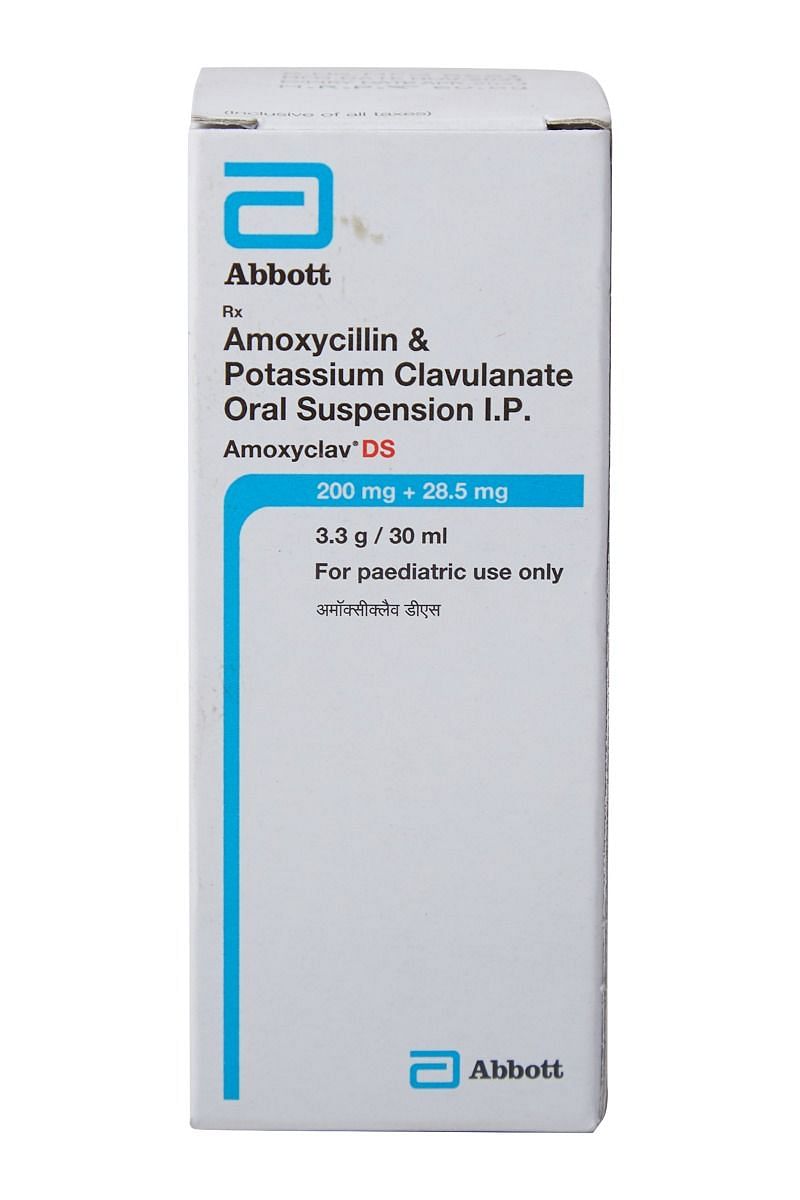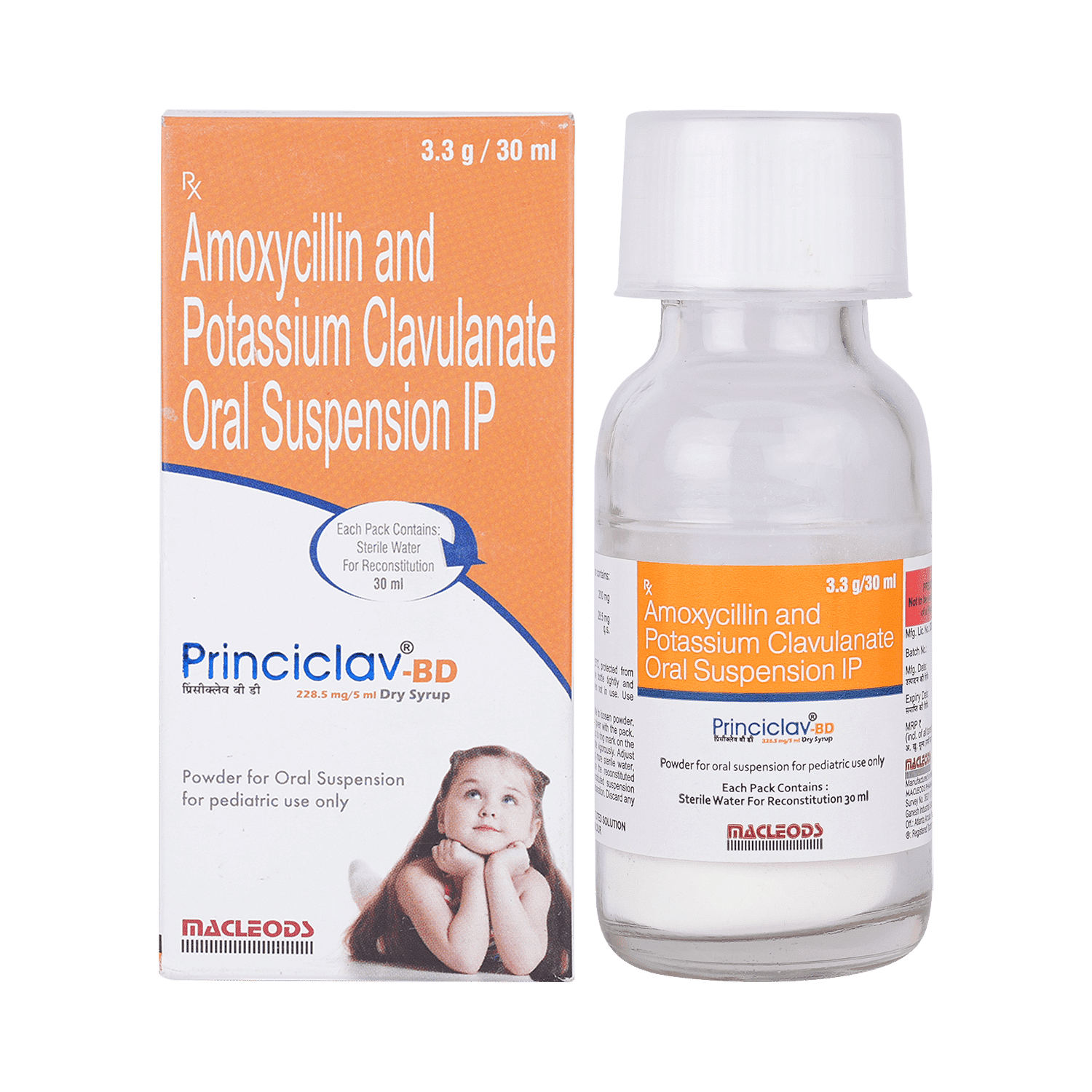
Proclav Dry Syrup
Manufacturer
Shrion Pharmaceuticals
Salt Composition
Amoxycillin (200mg) + Clavulanic Acid (28.5mg)
Key Information
Short Description
Proclav Dry Syrup is an antibiotic medicine used to treat bacterial infections in various parts of the body, including the ear, nose, throat, chest, lungs, teeth, skin, and urinary tract.
Dosage Form
Dry Syrup
Introduction
Proclav Dry Syrup is an effective antibiotic used to treat a variety of bacterial infections. It is particularly useful in treating infections that have become resistant to other antibiotics, including certain types of tuberculosis. The medicine contains two active ingredients, amoxycillin and clavulanic acid, which work together to kill bacteria and prevent their growth. While generally safe, it is important to complete the full course of treatment to avoid the risk of bacterial resistance. Side effects may include a bitter taste in the mouth and diarrhea, and it is crucial to consult a doctor if any severe reactions occur.
Directions for Use
Administer Proclav Dry Syrup as prescribed by your doctor. Ensure your child completes the entire course of antibiotics to prevent bacterial resistance.
How it works
Proclav Dry Syrup contains amoxycillin and clavulanic acid. Amoxycillin prevents the formation of the bacterial cell wall, essential for bacterial survival, while clavulanic acid inhibits beta-lactamase, an enzyme produced by resistant bacteria, making the combination effective against various infections.
Quick Tips
Your child must complete the entire course of antibiotics. Stopping too soon may cause the bacteria to multiply again, become resistant, or cause another infection. Your child may have a bitter taste in the mouth after the intake of Proclav Dry Syrup. Eating citrus fruit or sipping plenty of water or fruit juice may help. Encourage your child to drink plenty of water in case diarrhea develops as a side effect. Never give Proclav Dry Syrup until and unless prescribed by the doctor. You must also never share your child’s medicine with anyone else even if they show similar symptoms. Do not give Proclav Dry Syrup to treat common cold and flu-like symptoms caused by viruses. Never save medicine for future illnesses. It cannot be said whether the same medicine will work on future infections. Check ‘expiry’ before giving Proclav Dry Syrup to your child. Immediately discard all the expired medicines. Stop Proclav Dry Syrup immediately if your child develops an itchy rash, facial swelling, or breathing difficulty. Report to the doctor without any delay.
Related Medicines

Advent 228.5mg Dry Syrup Tangy Orange

Amoxyclav Dry Syrup

Moxikind-CV Dry Syrup

Princiclav -BD Dry Syrup

Amcv Dry Syrup

Dentoclav 200mg/28.5mg Dry Syrup

Moxit CV Dry Syrup

Alnos CV Dry Syrup

Moxylik Dry Syrup

Xylum Dry Syrup
Frequently asked questions
Can other medicines be given at the same time as Proclav Dry Syrup?
Proclav Dry Syrup may interact with other medications or substances. It is crucial to inform your child's doctor about all other medicines they are currently taking before starting Proclav Dry Syrup. Additionally, it is recommended to consult a healthcare professional regarding any medication administration for children.
Can I get my child vaccinated while on treatment with Proclav Dry Syrup?
Generally, antibiotics do not interfere with the ingredients in vaccines or cause adverse reactions in children who have been recently vaccinated. However, it is best to avoid administering vaccines to your child until they recover from any illness that may require antibiotic therapy. Once your child feels better, the vaccine can be administered.
Which lab tests may my child undergo while taking Proclav Dry Syrup on a long-term basis?
Long-term use of this medication may warrant periodic monitoring of kidney and liver function to assess your child's condition. This is done by your doctor.
Can I give a higher than the recommended dose of Proclav Dry Syrup to my child?
Giving a dosage higher than the prescribed amount can increase the risk of side effects and should be avoided. If you notice any increased severity of symptoms, consult your doctor for re-evaluation.
Can I stop giving Proclav Dry Syrup to my child when the symptoms are relieved?
No, do not discontinue this medication without consulting with your healthcare provider. It's crucial to complete the full course of treatment as symptoms may improve before the infection is completely eradicated, and continuing the medication might still provide beneficial effects.
Can the use of Proclav Dry Syrup cause diarrhea?
Proclav Dry Syrup can potentially cause diarrhea. This is because it targets harmful bacteria in your child's body, and also affects the healthy bacteria in their stomach. If your child experiences diarrhea, encourage them to drink plenty of fluids like water or oral rehydration solutions. In case of persistent diarrhea, please seek medical advice from a doctor, and avoid giving any medication without consulting your doctor.
Do all viral common colds result in secondary bacterial infection?
It's important to understand that most viral common colds do not lead to bacterial infections. In fact, antibiotics are unnecessary for treating a viral cold and may even lead to side effects in a child. Consult with your doctor before administering any medication.
The mucus coming out of my child’s nose is yellow-green. Is it a sign of a bacterial infection?
Yellow or green mucus in the nose does not necessarily indicate a need for antibiotics. During a common cold, it's normal for the mucus to change from clear to thicker and discolored. Symptoms usually last 7 to 10 days. Consult your child’s doctor if you have any concerns.
Is there any sign which shows that my child needs immediate medical attention?
You should seek immediate medical attention by calling your child's doctor immediately if they experience severe allergic reactions (difficulty breathing, skin rashes), gastrointestinal distress (diarrhea), or liver damage (weakness, paleness, vomiting). While rare, these can be significant and require expert medical management.


